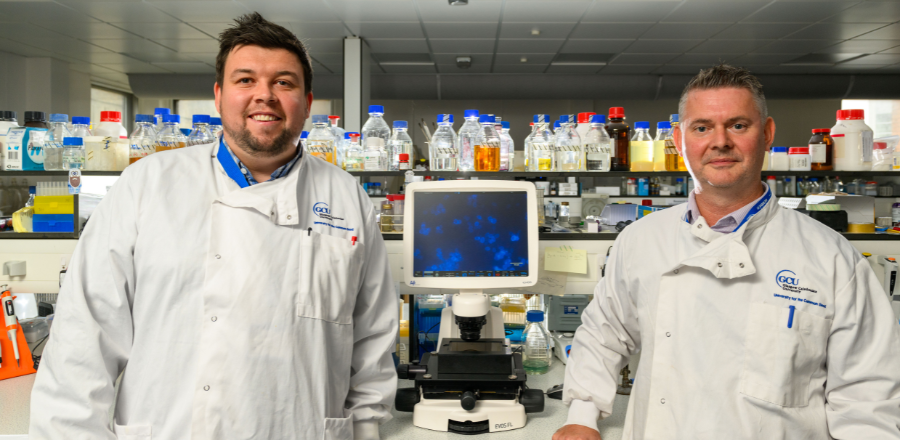Infection experts head-hunted by world-leading journal to write fungal risks review

Glasgow Caledonian’s internationally-renowned Professor of Infection Prevention and Control Gordon Ramage and top microbiologist Dr Ryan Kean have published an important review on fungal pathogens.
The pair’s reputation for research excellence triggered a request from Nature, the world's leading multidisciplinary science journal, to carry out a review of the breadth and growing impact fungal biofilms have on patients and the mechanisms promoting biofilm formation, focusing on how targeting these can improve treatment and potentially save lives.
They produced the review in collaboration with three other international experts from the European Society for Clinical Microbiology and Infectious Diseases (ESCMID) Study Group for Biofilms (ESGB) – Riina Rautemaa-Richardson, Craig Williams and Jose Lopez-Ribot.
Biofilms are communities of one or more types of microorganisms which cause a slimy build-up of bacteria and fungi that can grow on many different surfaces such as medical devices and bladder catheters, and cause infection. Infection from fungal biofilms are difficult to diagnose and treat. Left untreated, they can lead to the life-threatening infection sepsis.
The World Health Organization (WHO) has categorised four critical priority fungal pathogens that are considered an urgent antimicrobial resistance (AMR) threat and all four feature in the new Nature article.
The ‘Fungal biofilms in human health and disease’ review has been published in the Nature Reviews in Microbiology journal. The year-long review was a culmination of more than 25 years of research in the field by Professor Ramage and Dr Kean’s many years of expertise investigating bacterial and fungal infections.
Professor Ramage said: “Ryan and I were delighted to be asked by such a prestigious journal at Nature to carry out this review into the rising threat of fungal biofilms in hospitals. The impact of this journal is significant, and the article has been very well received among healthcare professionals and scientists. I was also asked to give an up-to-date expert opinion on the clinical importance of fungal biofilms.”
The Nature review was spotted by the ContagionLive, an infectious disease news resource for practitioners and specialists. Professor Ramage was interviewed by reporter Sophia Abene. Watch the interview here - https://www.contagionlive.com/view/fungal-biofilm-related-diseases-diagnosis-treatment-and-emerging-challenges.
Last October, Professor Ramage and Dr Kean revealed that they were about the begin an 18-month epidemiological study, funded by NHS Scotland Assure Service, to carry out patient screening, test and assess the most effective ways to manage Candida auris (C. auris) in a hospital environment, and support existing infection control guidelines.
C. auris is a type of yeast that can cause severe illness and spreads easily among hospital patients. It can cause a range of infections from superficial skin infections to more severe bloodstream infections.
Professor Ramage was also interviewed by NHS Scotland Assure about the research – watch it here https://www.napier.ac.uk/research-and-innovation/business-and-innovation-hub/innovate-with-us/joint-research-and-innovation/funding-support/nhsscotland-assure-research-service/understanding-candida-auris-transmission-and-disinfection-in-scotland
Professor Ramage co-leads the School of Health and Life Sciences’ Research Centre for Health (ReaCH) safeguarding Health through Infection Prevention (SHIP) Research Group, a multidisciplinary team of researchers, including nurses, microbiologists, and epidemiologists. Dr Kean is lead researcher in Drug Discovery and Biofilm Control within the SHIP group.
Professor Ramage is based in the Department of Nursing and Community Health and Dr Kean is a Lecturer in Clinical Microbiology in the Department of Biological and Biomedical Sciences.
